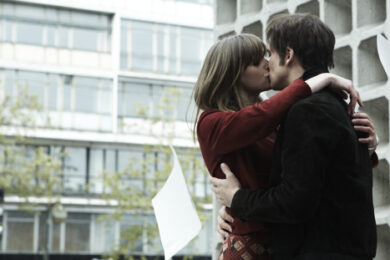Girl meets boy, girl has baby with boy, girl meets another boy, girl runs off with new lover to become terrorist.
The bare outline of the Gudrun Ensslin story is conventional to a point, but then takes a sharp lurch to the left. Growing up in a West Germany rebuilding psychologically and physically from the Second World War, she rejected her family to join up with Andreas Baader to become a leading light of the Red Army Faction (RAF), aka the Baader-Meinhof Gang.
If only the German drama If Not Us, Who? (Wer wenn nicht wir) had taken her life as its starting point, it might have more to say. Sadly, Ensslin is relegated to a supporting role in this ‘radical love story’. Instead, the central character in Andres Veiel’s drama is one Bernward Vesper: a sad sack eager to please his Nazi-sympathiser author father and aloof mother. This is a father who shoots the family cat for killing a bird and then explains to his young son that “cats are the Jews of the animal kingdom”.
Seeking to please the old man, Bernward agrees to republish his writings posthumously, therefore establishing himself as a rather politically pliable character. Bonding with fellow university student Gudrun Ensslin over a love of John Steinbeck, he starts up a publishing house, inviting her to join in his enterprise. The relationship between the two is key to the film, and scenes of Ensslin reading the works of Martin Luther King aloud to Vesper are presumably meant to illustrate how their bond is as much intellectual as physical, while also establishing the political tensions between them. In any case, they become lovers.
This being the early ’60s, monogamy is suspect, and she allows him to bring her housemate Dorte into their bed, but quickly becomes jealous and the relationship proves turbulent. Ensslin even attempts suicide, but is rescued by Vesper, and they decide to move to West Berlin.
Cue the entrance of Andreas Baader, holding court at a leftist activist meeting, while being derided by an onlooker as a "stray". As played by Alexander Fehling (sans moustache, oddly), Baader is all swagger and brute force and little intellect, lashing out physically at any suspected bourgeois behaviour. He thinks nothing of making a move on Ensslin while Vesper is away in London.
The most potentially interesting aspect of the Ensslin-Baader romance is only hinted at. Taking her out to a drag bar, an eyelinered Baader croons along with the drag performers, embracing them and kissing them. If this is meant to show his feminine side, it certainly does that, but other than a post-carnal moment when Ensslin asks if he’s slept with men, it is never referenced again. Too bad. Andreas Baader: The Drag Years would be a cracker. (For the homoerotic potential of the RAF, see the works of Bruce LaBruce, especially The Raspberry Reich.)
The fact that Vesper, newly returned from wooing the Black Panthers in London, discovers the two lovers in bed does nothing to hinder their amour fou, and given his own dalliances, there is little Vesper can do to quash the affair. At first it seems like Ensslin is only seeking revenge on her partner for his wandering eye, but despite Baader treating her like shit, she eventually chooses him and the violent overthrow of the state in preference to what she sees as Vesper’s bourgeois bookishness. He is left holding baby Felix, while she and Baader bomb a department store in Frankfurt, a crime for which they go to prison. Even then, Vesper offers support to their cause, looking on in anguish as the two kiss in the dock. Needless to say, the story has no happy ending.
Writer-director Andres Veiel has long been fascinated by the RAF. His 2001 documentary Black Box BRD was a far more compelling work, detailing the disillusionment and social conditions that proved fertile ground for Baader-Meinhof to take hold and build up its murderous rage – in particular, the suspicion and disdain held by the post-war generation for its own parents’ involvement in Nazism.
If Not Us, Who? is Veiel’s first fiction film, and his inexperience shows. A fractious screenplay and clumsy direction do not fine drama make. The two leads, August Diehl as Vesper, and Lena Lauzemis as Ensslin, do the best they can, but exhibit little chemistry. It doesn’t help that Diehl is saddled with the worst haircut this side of Gareth from The Office, and it’s hard to believe him as a ladies man, bedding women left, right and centre, while his utterly stunning girlfriend glowers in a corner. If the film shows nothing else, it’s that Ensslin had appalling taste in men. Lauzemis conveys believable outrage and revolutionary fervour in the latter stages, but her journey from provincial trainee teacher to cold-eyed terrorist is not convincingly explained by the screenplay.
The story is filled with odd jumps: one minute Vesper is squabbling with Ensslin and the next he is lying feverish in bed drawing on the wall with a crayon. Is he physically ill? On a drug trip? Suffering from nachkrieg existential angst? Who knows?
If Uli Edel’s 2008 biopic The Baader Meinhof Complex was all action, putting guns into its characters’ hands at every opportunity, this film is curiously coy about showing what the faction did. Explosive moments, such as the department store attack, are seen in brief archive clips, as if the director feels the need to remind his audience that THIS REALLY HAPPENED. And there are curious omissions: Ulrike Meinhof, whose prison interviews with Ensslin led her to join forces with the group, does not even appear in the film.
This ‘radical love story’ is really quite tame and conventional, and there is precious little of the radical politics that made this time so exciting and dangerous. The conflict between youth and authority, the questioning of domestic and foreign policy, the alliances with countries and people far away, such as the Viet Cong and Black Panthers: all this could have made for a powerful and timely drama, drawing out parallels and differences with contemporary society.
The use of Vietnam War footage, with which the director dots the story, is significant, because several times the activists-turned-terrorists assert, “This is war”, as the German state or their political opponents take some oppressive action. So, clearly this is meant to signify their turn from words to actions. But we never see that. It just sounds melodramatic and clumsy.
Where did all that righteous anger go? Who actually came out on top from the conflicts? Can dramatic societal changes be made at the point of a gun? From pamphleteering? Or from parliamentary process? The film touches on such questions, without really exploring any of them. And the three main characters’ lives are cut short before they ever arrive at any answers, their self-destructive behaviour to blame for their demise. At the end, one could only think: poor Felix, being born into such chaos and left alone to make sense of it all.



